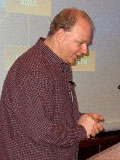Presentation: "The .NET Language Integrated Query Framework: An Overview"
Track:
.NET Best Practices
Time:
Monday 11:00 - 12:00
Location:
Conference Hall
Abstract: Modern applications operate on data in several different forms: Relational tables, XML documents, and in-memory objects. Each of these domains can have profound differences in semantics, data types, and capabilities, and much of the complexity in today's applications is the result of these mismatches. The future "Orcas" release of Visual Studio aims to unify the programming models through integrated query capabilities in C# and Visual Basic, a strongly typed data access framework, and an innovative API for manipulating and querying XML. This talk introduces each of these areas and walks through how they are related.
 Download slides
Download slides
Presentation: "Why VB is my Favorite Language"
Track:
Enterprise .NET Development
Time:
Tuesday 10:15 - 10:45
Location:
SAS Dania
Abstract: Some people have compared type systems with a dial; however in most languages that dial is either completely off (dynamically typed languages) or completely on (statically typed languages). Visual Basic is unique in that it allows the dial to cover the whole spectrum; it supports static typing where possible and allows dynamic typing where necessary. In this talk we will show some of the present and future support of mixed static and dynamic typing in Visual Basic.
 Download slides
Download slides
Presentation: "6GL features languages to come"
Track:
Sixth Generation Languages
Time:
Tuesday 13:00 - 14:00
Location:
Conference Hall
Abstract: Moving forward, the dominant costs for IT projects are people costs more than hardware costs. Meeting business needs revolves around improving developer productivity. This provides great opportunities for language designers and compiler writers to concentrate on providing more powerful high-level programming abstractions rather than than on low-level optimizations.
This desire for more abstraction has lead to a plethora of new domain specific programming languages for manipulating data including XML with XSLT and XQuery, objects with OQL, and relational data with SQL. We argue that instead of creating such specialized languages, general purpose languages such as C# and Visual Basic should be extended with query capabilities. This allows programmers to query any form of data, using a broad notion of "collection".
We will discuss various advancements in Visual Basic towards simplifying the development of data intensive applications. In particular we will concentrate on ways to bridge the impedance mismatches between objects, relation data, and XML and the importance of dynamism in this trend.
 Download slides
Download slides
Presentation: "C# 3.0 revealed"
Track:
Enterprise .NET Development
Time:
Tuesday 14:30 - 15:30
Location:
SAS Dania
Abstract: In this talk C# 3.0 will be revealed for the first time in Europe.
 Download slides
Download slides
 Erik Meijer is an architect in the Microsoft SQL server division where he currently works together with the Microsoft Visual C# and the Microsoft Visual Basic language design teams on data integration in programming languages. Prior to joining Microsoft he was an associate professor at Utrecht University and adjunct professor at the Oregon Graduate Institute. Erik is one of the designers of the standard functional programming language Haskell98 and more recently the Cw language.
Erik Meijer is an architect in the Microsoft SQL server division where he currently works together with the Microsoft Visual C# and the Microsoft Visual Basic language design teams on data integration in programming languages. Prior to joining Microsoft he was an associate professor at Utrecht University and adjunct professor at the Oregon Graduate Institute. Erik is one of the designers of the standard functional programming language Haskell98 and more recently the Cw language.













